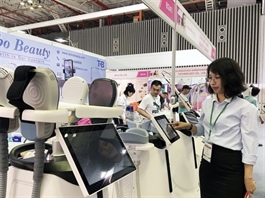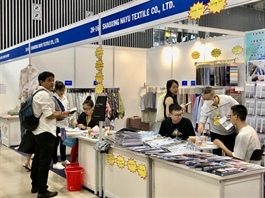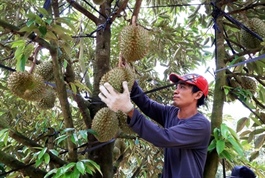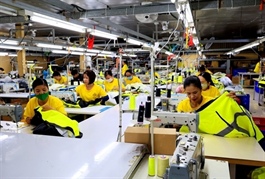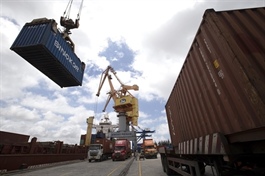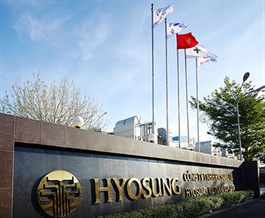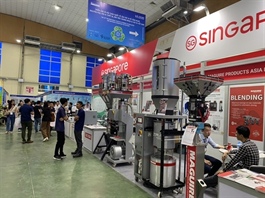Businesses demand reasonable tariffs for mandatory recycling of packaging materials
Businesses demand reasonable tariffs for mandatory recycling of packaging materials
The proposed cost for recycling packaging in the Ministry of Natural Resources and Environment’s draft regulation are unreasonably high, which would push up prices, causing difficulties for themselves and consumers, businesses said.
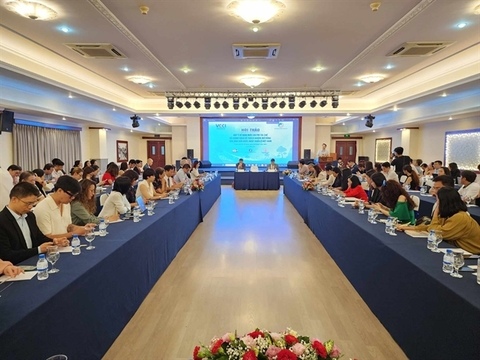
Delegates at a seminar held to collect opinions from the business community on the proposed rates for recycling packaging. — VNS Photo |
The ministry needs to reconsider it and set more reasonable costs to ensure sustainable production and consumption, they told a seminar held in HCM City on Friday to collect businesspeople’s opinions on the draft with respect to the amount to be paid per unit produced for recycling of discarded products and packaging materials by manufacturers and importers under the Extended Producer Responsibility (EPR) scheme.
The Law on Environmental Protection requires them to implement the EPR from January 1, 2024.
They can recycle them themselves or pay to the Vietnam Environmental Protection Fund to enable recycling.
The Ministry of Natural Resources and Environment will issue specific norms for each type of product and packaging and adjust them every three years.
Under Decree No.08, the payment to the Vietnam Environmental Protection Fund will be determined according to the recycling rate and cost and the volume of products and packaging sold in the market.
Chu Vân Anh, deputy chairwoman of the Vietnam Beer-Alcohol-Beverage Association, said while the draft dated July 26 has reduced a number of rates in the previous draft, some others still exceed those of 14 affluent western European countries.
For instance, it is 1.26 times their rate for recycling aluminium packaging and 2.12 times for glass, she said.
For just the three main packaging materials, paper, plastic and metal, enterprises would have to pay an estimated VNĐ6.1 trillion per year, and pay on top of that for other materials and used products, she said.
Other delegates said excessively high cost would escalate goods prices, creating challenges for businesses and adversely impacting people’s livelihoods.
James Ollen, executive director of AmCham Vietnam’s HCM City chapter, said used packaging materials made from aluminium, iron, cardboard, and rigid PTE fetch recyclers good money.
“Therefore, it is unreasonable to require businesses and the 100 million Vietnamese consumers, who are already facing significant challenges, to provide additional support to already profitable recyclers.”
Besides, because of their value, packaging materials are efficiently recycled with minimal environmental impact, he pointed out.
He and representatives of business associations suggested that the ministry set a reasonable level based on certain criteria.
For materials with high recycling value that exceeds recycling costs, such as aluminium, iron, cardboard, rigid PET packaging, etc., and where recycling operations are already profitable, there should be no fee, they suggested.
For other materials, they suggest to apply a coefficient of 0.2 for glass, 0.2 or 0.3 for mix-paper packaging, 0.3 for single soft packaging material, and 0.5 for multiple soft packaging material to make the recycling cost not too high, similar to that of western European countries, and similar to the research findings from the Packaging Recycling Organisation Vietnam.
Besides, the drafting committee should exclude the proposed 2 per cent administrative cost, they said, pointing out that the interest accrued from businesses’ contributions to the Vietnam Environmental Protection Fund would easily cover this.
They wanted businesses and manufacturing associations to have a say in deciding the recycling cost instead of just recyclers.
Ollen said: “Businesses should be granted the flexibility to pursue a hybrid approach, combining both self-recycling and recycling support payments for a specific type of packaging/product … instead of obligating them to choose either option since the law and guidelines do not explicitly restrict such an approach.
“Lastly, we strongly advocate for the Government to introduce favourable policies to promote environment-friendly packaging and encourage the use of recycled materials.”
The seminar was organised by the Việt Nam Chamber of Commerce and Industry in collaboration with the National EPR Council, Vietnam Beer-Alcohol-Beverage Association, Vietnam Plastics Association and Food and Foodstuffs Association of HCM City.







